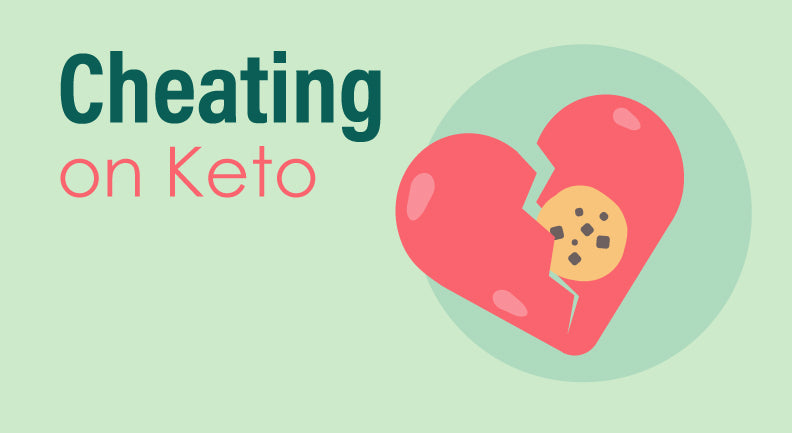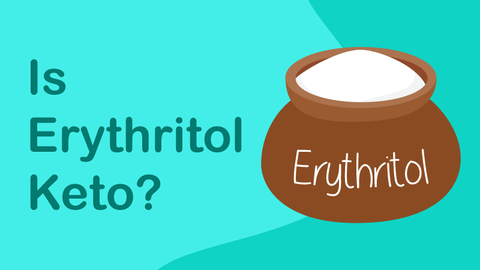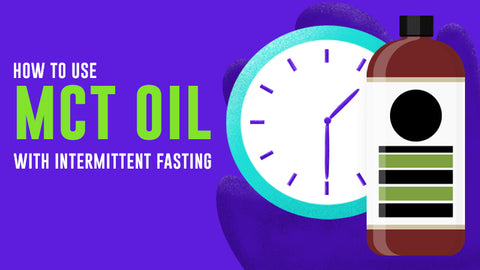Cheating on Keto: What are the Impacts, How Bad Is It, and How To Recover

on June 06, 2019
Cheat meals, days or even weeks are inevitable. There will be times you have to compromise, no matter how diligent you are - this is just part of your personal keto journey.
So the question is: when you cheat on a keto diet what are the impacts, how bad is it and most importantly how can you minimize the number of times you end up eating way too many carbs?
Can You Cheat on Keto and How Bad Is It?
Of course you can stray from the keto diet. There are no hard and fast rules which prohibit you from doing so and there are actually several keto diets which encourage carb cheat days or carb cheat meals. Specifically I'm referring to the targeted keto diet (TKD) and the cyclical keto diet (CKD).
The cyclical keto diet builds in 1 or 2 carb re-load days per week. These re-feeding days are thought to have several positive impacts including building muscle, balancing your micronutrients and may even play a role in managing hormones.
If you are extremely active or you lift heavy you may look to the targeted keto diet as a potential alternative to a standard keto diet. On the TKD you consume carbs before an intense workout. Eating a high-carb meal before a workout can replenish glycogen stores and prevent low blood sugar which can lead to fatigue.
However, if you're not very active these types of cheat meals or cheat days can make it extremely hard to get into ketosis. If you're constantly sneaking carbohydrates into your diet your body will never enter nutritional ketosis.
What Else Happens When you Cheat on the Keto Diet
The most obvious consequence to eating a high number of carbs is that your body won't enter a state of ketosis. But in addition to that, there are a few other drawbacks to consider.
Fat Adaption
After a prolonged period of sticking to a keto diet your body will become fat adapted. This means that your body has become accustom to burning ketones for energy. There aren't any definitive studies which pinpoint exactly how long that takes, but this is a great read which shows it likely takes at least three weeks, probably much longer.
Once you're fat adapted the keto flu shouldn't cause issues, your cravings for carbs will be reduced and you shouldn't experience the energy swings that are typical when first starting the keto diet. It will also be easier to get back into ketosis after you're fat adapted.
If you're new to the keto diet and you are continually eating cheat meals you won't allow your body to become fat adapted. Sticking to a strict keto diet for the first several months will allow your body to reach this state and set you up for long term success.
Endothelial Damage
Sudden changes in carbohydrate intake may have some negative health effects, according to preliminary research out of the University of British Columbia Okanagan.
The study measured the effects of one-week high-fat, high-protein, low-carb diets. The interesting bit to us, however, is some measurements taken at the end of the study when participants abruptly increased their consumption of carbs again.
Though small, the researchers observed that high-carbohydrate interruptions during a ketogenic diet increased amounts of endothelial damage in research subjects.
From the conclusion: “These new findings suggest that if young, healthy males are following such diets, a temporary lapse in adherence with consumption of food causing a glucose spike might lead to acute endothelial damage.”
Endothelial damage, or destruction of the cells that line the blood vessels, is linked to a higher risk of heart disease.
Again, this is a small study, and it would be irresponsible to suggest that we should all go about our lives passing up the occasional slice of pie during the holidays.
The point is more that if you’re following keto, there is some scientific evidence that suggests regular, big glucose spikes while in ketosis may not be good for you.
You Cheated On Your Diet. So What?
For many, it’s just as hard to stay on a diet as it is to start one in the first place. We cheat on our diets for all kinds of reasons - impulse, opportunity, the lack of more appropriate food options - so it’s doubly important to not beat yourself up too much.
While cheating on the keto diet is a little more complicated than other diets, it’s best to remember that falling off the wagon every once in a while isn’t the worst thing in the world.
According to dietician Mike Roussell in Shape magazine, you shouldn’t let the occasional misstep derail your attitude about food: “Surprisingly, knowing that you can cheat anytime usually lessens any desire food has over you, so tossing those restrictions will actually help you need restrictions less.”
How to Prevent Cheating
Once you identify the factors that drive your will to cheat, it becomes easier to avoid the practice altogether. Here are several tips that can help you avoid cheating on the ketogenic diet.
Keep Keto-Approved Foods On Hand
Two factors that inspire many people to cheat on their diets are impulse and opportunity. When hunger strikes and you find yourself without keto-approved foods, it’s very easy to grab the nearest thing. Luckily, the solution is a simple. Have a few keto-friendly energy bars or other snacks in your desk or bag, so you can stay on track while you’re on-the-go.
Many keto veterans also suggest keto meal prep so that you have ready-to-eat meals when you need them. By making large amounts and pre-portioning food into meals for the week, you save time, money, and avoid the temptations that will cut ketosis short.
Another option is to follow a meal plan. Following a meal plan is a great option if you constantly find yourself asking what should I make for dinner?
All of these will reduce your dependence on your willpower, which is thought to be a finite resource. The key to any habit, whether it's diet, exercise or any other positive lifestyle change is to make it as easy as possible to stay on track when you do not feel like it.
Reward Yourself with Non-Food Items
Modern food culture often uses food as a means of rewarding yourself. A “pick-me-up” usually consists of a sugary coffee drink or baked good. The keto diet can help you break this bad eating behavior.
One of the easiest ways to rid yourself of this habit is to use a reward system that isn’t based on food. Treat yourself to a day at the spa or another enjoyable experience. Get those new shoes that you like or take yourself to the movies. When you break free from food as a reward, you remove many forms of temptation that are hard to resist otherwise.
Overeat, Don’t Cheat
If all else fails, stick to the motto “overeat, don’t cheat”.
Instead of eating carbs, try filling the void with more keto-friendly food.
In the long run, eating more of the foods your body is already used to is less jarring than impulsively eating an entire cupcake. This means that you may spare yourself the difficulty of starting the ketosis process over.
Choose a Keto-Friendly Treat
Carbs are addictive, that's what makes sticking to any low-carb high-fat diet so difficult. One way to conquer these cravings is to arm yourself with keto-friendly treats. There are so many delicious AND satisfying options that are keto approved, you just have to know where to look. Here are a few suggestions:
- Halo Top ice cream
- Left Coast Performance Nut Butter
- Homemade Keto Chocolate Chip Cookies
What to Do When You Cheat
So you cheated on your keto diet. Now what? Here’s our checklist to help you recover and get back into ketosis.
Assess Your Status
The first thing to do after you cheat is to revert back to your normal keto diet and determine whether or not you are still in ketosis. What may kick one person out of ketosis may not be enough for somebody else, so making this determination is always the first step to getting back on the wagon. Ketone testing strips can help you make this call, and are available in strips that test your blood or urine.
Prepare for Side Effects
For those no longer in ketosis, the second step is to prepare for side effects. The sudden introduction of carbohydrates to a body used to the ketogenic diet may cause symptoms similar to the dreaded keto flu.
In order to combat feelings of nausea, headaches, and fatigue, it’s important to drink plenty of water and balance out electrolytes. By doing so, your body can readjust to consuming ketones instead of blood glucose.
Understand the Why
A one-time occurrence of cheating on the keto diet probably shouldn’t be blown out of proportion. However, understanding the drivers of cheating behavior can ensure that a one-time incident doesn’t develop into a pattern.
“For most people, weight loss is 90% attitude,” says dietitian and nutritionist Susan McQuillan in Psychology Today. By making the experience as fun and easy as possible, you’ll be more likely to adhere to your diet, and keto is no exception.
Take some time to reflect on what you were feeling at the time of the incident. Were you surrounded by carbs? Were you feeling down? Or were you just hungry?
By understanding the why behind cheating behaviors, you can adjust your lifestyle to better combat points of weakness. Simple changes like keeping keto-friendly snacks like pork rinds, nuts, beefy jerky or veggies on hand will help you avoid carb foods and avoid spiking your blood sugar levels.
How to Reboot Your Ketosis
Aside from returning to your normal keto diet, there are a few things that can speed the process along and help you achieve ketosis faster.
Exercise
Physical activity will draw on glycogen stores for energy. The more intense the exercise the quicker you will deplete your glycogen stores. Once these stores have been depleted fat will begin to be broken down into ketone bodies for energy.
Introduce MCTs
According to some studies, medium-chain triglycerides, or MCTs, can help your body alleviate the symptoms of keto induction (and by extension make your keto flu a bit more tolerable).
This is due to the fact that medium-chain triglycerides are digested more quickly than other nutrients in the body, and are absorbed directly in the liver. MCTs are found in coconut oil and dairy products. You can also buy pure C8 and C10 MCT oil.
Intermittent Fasting
By engaging in intermittent fasting in addition to a keto-friendly diet, you might reach ketosis at an accelerated rate. As is the case with exercise, fasting will help deplete glycogen stores, reverting your body back into ketosis.
How We Can Help
At Left Coast Performance, it’s our mission to deliver the tools you need to sustain your keto journey. We deliver products with premium, clean-label ingredients that you can trust.
If you feel like you’re starting to slip, be sure to check out our MCT oil, which can deliver a much-needed dose of ketones when you need it most.
At Left Coast Performance, we’re dedicated to helping you avoid cheat days and maximize your results.














